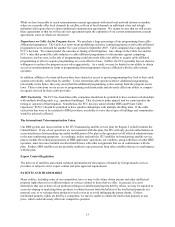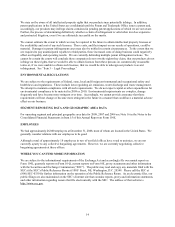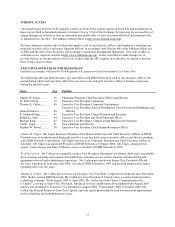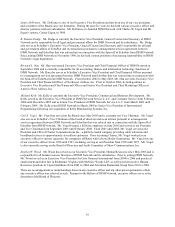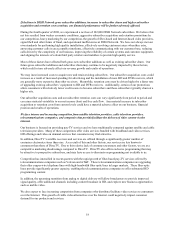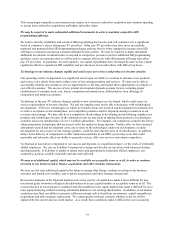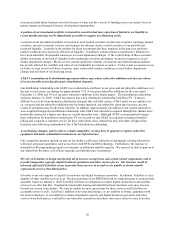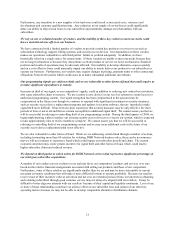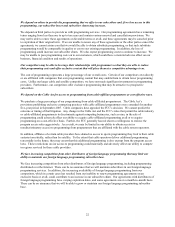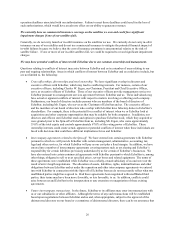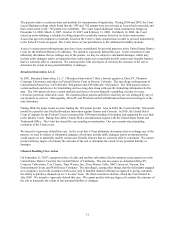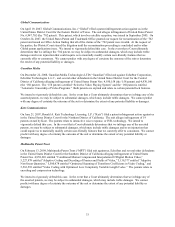Dish Network 2008 Annual Report Download - page 33
Download and view the complete annual report
Please find page 33 of the 2008 Dish Network annual report below. You can navigate through the pages in the report by either clicking on the pages listed below, or by using the keyword search tool below to find specific information within the annual report.23
Our local programming strategy faces uncertainty because we may not be able to obtain necessary retransmission
consents from local network stations.
SHVIA generally gives satellite companies a statutory copyright license to retransmit local broadcast channels by
satellite back into the market from which they originated, subject to obtaining the retransmission consent of the local
network station. If we fail to reach retransmission consent agreements with broadcasters we cannot carry their
signals. This could have an adverse effect on our strategy to compete with cable and other satellite companies
which provide local signals. While we have been able to reach retransmission consent agreements with most local
network stations in markets where we currently offer local channels by satellite, roll-out of local channels in
additional cities will require that we obtain additional retransmission agreements. We cannot be sure that we will
secure these agreements or that we will secure new agreements on acceptable terms upon the expiration of our
current retransmission consent agreements.
We are subject to significant regulatory oversight and changes in applicable regulatory requirements could
adversely affect our business.
DBS operators are subject to significant government regulation, primarily by the FCC and, to a certain extent, by
Congress, other federal agencies and international, state and local authorities. Depending upon the circumstances,
noncompliance with legislation or regulations promulgated by these entities could result in the suspension or
revocation of our licenses or registrations, the termination or loss of contracts or the imposition of contractual
damages, civil fines or criminal penalties any of which could have a material adverse effect on our business,
financial condition and results of operations. You should review the regulatory disclosures under the caption “Item
1. Business — Government Regulation — FCC Regulation under the Communication Act” of this Annual Report on
Form 10-K.
We have made a substantial investment in certain 700 MHz wireless licenses and will be required to make
significant additional investments in order to commercialize these licenses and recoup our investment.
We paid $712 million to acquire certain 700 MHz wireless licenses, which were granted to us by the FCC in
February 2009. We will be required to make significant additional investments or partner with others to
commercialize these licenses and satisfy FCC build-out requirements.
We expect to invest significant additional amounts to develop services and infrastructure to effectively utilize the
spectrum and provide services to our customers. We will also need to comply with the technical and operational
rules and regulations adopted by the FCC for this spectrum, including specific build-out requirements. Part or all of
our licenses can be terminated for failure to satisfy these requirements. Specifically, we will be required to meet
interim build-out benchmarks by June 2013. Failure to meet an interim benchmark requirement will cause a two
year reduction in our license term (from 10 years to 8 years) and may result in enforcement action, including
forfeitures, and the loss of right to operate in any unserved areas.
There can be no assurance that we will be able to develop and implement a business model that will realize a return
on these investments and profitably deploy the spectrum represented by the 700 MHz licenses.
Furthermore, the fair values of wireless licenses may vary significantly in the future. In particular, valuation swings
could occur if:
x consolidation in the wireless industry allows or requires wireless carriers to sell significant portions of their
wireless spectrum holdings, which could in turn reduce the value of our spectrum holdings; or
x a sudden large sale of spectrum by one or more wireless providers occurs.
In addition, the fair value of wireless licenses could decline as a result of the FCC’s pursuit of policies, including
auctions, designed to increase the number of wireless licenses available in each of our markets. If the fair value of
our 700 MHz licenses were to decline significantly, the value of our 700 MHz licenses could be subject to non-cash
impairment charges. We assess potential impairments to our indefinite-lived intangible assets, including our 700
MHz licenses annually to determine whether there is evidence that events or changes in circumstances indicate that
an impairment condition may exist. Estimates of the fair value of our 700 MHz licenses are based primarily on


